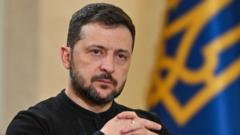In what may be one of the most pivotal moments in Ukraine's ongoing struggle, President Volodymyr Zelensky is confronted with an increasingly precarious situation as the United States has suspended aid following a tense meeting with President Donald Trump. With his options narrowing, Zelensky's leadership faces pressure not only from the U.S. but also from inside Ukraine, as calls for potential change arise amidst the backdrop of a protracted conflict with Russia.
Trump's sharp words signal that the U.S. is playing hardball. "You don't have the cards right now," he declared, leaving Zelensky to grapple with whether to alter his approach or even contemplate resignation—a thought that remains largely unthinkable for a leader under siege from Russian aggression. Trapped between a rock and a hard place, Zelensky’s best course may involve negotiating a deal based on mineral resources with the U.S. to regain crucial financial support, as indicated by his chief aide’s recent discussions with American lawmakers.
However, the idea of crawling back to Trump for forgiveness or compromise on terms unacceptable to Ukrainians, who have endured significant sacrifices, is an uncomfortable dilemma for Zelensky's administration. The suggestion of an apology, coupled with a ceasefire agreement crafted on Trump’s terms, adds layers of complexity to a scenario where any perceived capitulation might fend off public outrage and loss of credibility.
As Zelensky contemplates strategic alliances, he may also consider bolstering ties with European nations—an option bolstered by the European Union’s commitment to enhance defense capabilities with significant funding. Despite mixed messages and the obvious reality of the U.S. aid shortfall, Ukrainian leaders maintain the stance that robust U.S. security guarantees are indispensable for their ongoing conflict and future negotiations.
While faced with internal pressures and the undeniable threat from Russia, Zelensky is compelled to tread carefully, balancing the competing demands of sovereignty, international cooperation, and the future of Ukraine during a defining moment in its history. The postponed aid has individuals on the ground expressing confidence that Ukraine can endure, yet the efficiency of its defense forces ultimately hinges upon the essential support that has historically flowed from the United States.
Trump's sharp words signal that the U.S. is playing hardball. "You don't have the cards right now," he declared, leaving Zelensky to grapple with whether to alter his approach or even contemplate resignation—a thought that remains largely unthinkable for a leader under siege from Russian aggression. Trapped between a rock and a hard place, Zelensky’s best course may involve negotiating a deal based on mineral resources with the U.S. to regain crucial financial support, as indicated by his chief aide’s recent discussions with American lawmakers.
However, the idea of crawling back to Trump for forgiveness or compromise on terms unacceptable to Ukrainians, who have endured significant sacrifices, is an uncomfortable dilemma for Zelensky's administration. The suggestion of an apology, coupled with a ceasefire agreement crafted on Trump’s terms, adds layers of complexity to a scenario where any perceived capitulation might fend off public outrage and loss of credibility.
As Zelensky contemplates strategic alliances, he may also consider bolstering ties with European nations—an option bolstered by the European Union’s commitment to enhance defense capabilities with significant funding. Despite mixed messages and the obvious reality of the U.S. aid shortfall, Ukrainian leaders maintain the stance that robust U.S. security guarantees are indispensable for their ongoing conflict and future negotiations.
While faced with internal pressures and the undeniable threat from Russia, Zelensky is compelled to tread carefully, balancing the competing demands of sovereignty, international cooperation, and the future of Ukraine during a defining moment in its history. The postponed aid has individuals on the ground expressing confidence that Ukraine can endure, yet the efficiency of its defense forces ultimately hinges upon the essential support that has historically flowed from the United States.






















